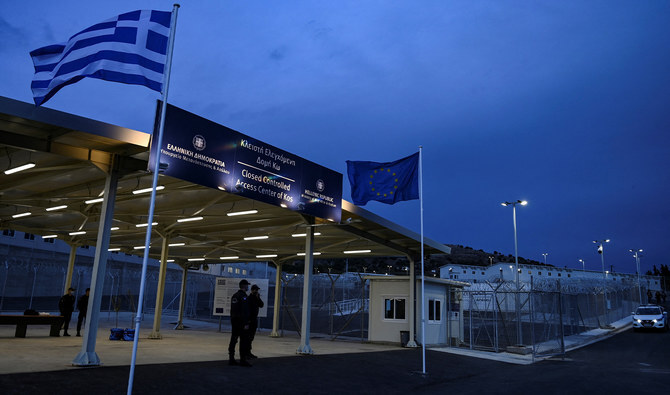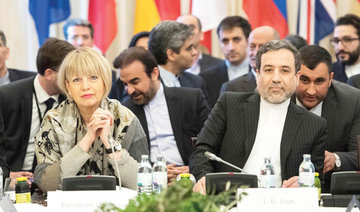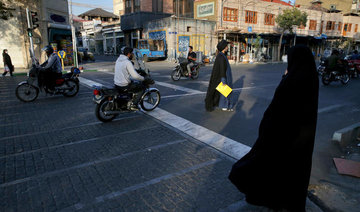WASHINGTON: The future of the landmark Iran nuclear deal hangs in the balance and its survival may depend on the unlikely success of last-minute European interventions with President Donald Trump.
French President Emmanuel Macron and German Chancellor Angela Merkel are to visit Washington separately later this month and, barring a sudden trip by British Prime Minister Theresa May, will likely be the last foreign leaders invested in the deal to see Trump ahead of his mid-May deadline for the accord to be strengthened. Trump has vowed to withdraw from the 2015 agreement by May 12 unless US, British, French and German negotiators can agree to fix what he sees as its serious flaws.
Iran has said US withdrawal from the nuclear deal and reimposed sanctions would destroy the agreement and has threatened a range of responses, including immediately restarting nuclear activities currently barred under the deal.
Negotiators met for a fourth time last week and made some progress but were unable to reach agreement on all points, according to US officials and outside advisers to the Trump administration familiar with the status of the talks. That potentially leaves the Iran deal’s fate to Macron, who will make a state visit to Washington on April 24, and Merkel, who pays a working visit to the US capital on April 27, these people said.
“It’s important to them and I know they’ll raise their hopes and concerns when they travel here to the United States in the coming days,” Mike Pompeo, the CIA chief and secretary of state-designate, told lawmakers on Thursday.
Pompeo’s testimony at his Senate confirmation hearing came a day after the negotiators met at the State Department to go over the four issues that Trump says must be addressed if he is to once again renew sanctions relief for Iran, officials said.
Those are: Iran’s ballistic missile testing and destabilizing behavior in the region, which are not covered by the deal, along with inspections of suspected nuclear sites and so-called “sunset provisions” that gradually allow Iran to resume advanced nuclear work after several years, which are part of the agreement.
Two senior US officials said the sides are “close to agreement” on missiles and inspections but “not there yet” on the sunset provisions.
“Malign” Iranian activities, including its support for Lebanon’s Hezbollah movement, Syrian President Bashar Assad and Houthi Shiite rebels in Yemen, were dealt with in a separate session that ended inconclusively, according to the officials, who like the outside advisers were not authorized to discuss the matter publicly and spoke on condition of anonymity.
The two officials and two outside advisers said the missile and inspections issues are essentially settled, but would not detail exactly what had been agreed or predict whether it would pass muster with Trump, let alone his new national security adviser John Bolton and Pompeo. Both men are Iran hawks and share the president’s disdain for the deal, which was a signature foreign policy achievement of former President Barack Obama.
Bolton and Pompeo’s voices on Iran could be heard as senior US officials discussed Trump’s decision to launch airstrikes against Syria on Friday. In addition to punishing Syria for its apparent use of chemical weapons, the strikes were meant to send a message to Iran about its role in the country, the officials told reporters on Saturday.
The officials and advisers said the main sticking point on the Iran deal remains the sunset provisions, with the Europeans balking at US demands for the automatic re-imposition of sanctions should Iran engage in advanced nuclear activity that would be permitted by the agreement once the restrictions expire.
To clear the impasse, one official and one outside adviser said a compromise is being considered under which sanctions would be re-imposed if Iran did enough work to reduce the time it would need to develop a nuclear weapon to less than a year. The current deal aims to keep Iran’s so-called “breakout time” to a year. But the expiration of the sunset provisions, the first of which is in 2024, means that the breakout time could eventually drop.
The Europeans, who along with the Iranians, have said they will not re-open the deal for negotiation, are reluctant to automatically re-impose sanctions for permitted activity, but have agreed in principle that Iran dropping below a one-year breakout time should be cause to at least consider new sanctions, according to the official and the adviser. How that breakout time is determined is still being discussed, they said.
Given the remaining differences, US national security officials are stepping up planning for various “day after” scenarios, including how to sell a pullout as the correct step for national security, how aggressively to reimpose US sanctions on Iran that had been lifted under the agreement and how to deal with Iranian and European fallout from such a step.
Future of Iran deal may depend on European intervention
Future of Iran deal may depend on European intervention

Syrian state media: Israel attacked town near Lebanon border

“An Israeli aggression targeted the industrial zone in Al-Qusayr” in Homs province, the official SANA news agency said. There was no immediate news of casualties or damage.
Health ministry in Hamas-run Gaza says war death toll at 43,391

- The toll includes 17 deaths in the previous 24 hours
GAZA STRIP: The health ministry in Hamas-run Gaza said on Tuesday that at least 43,391 people have been killed in the year-old war between Israel and Palestinian militants.
The toll includes 17 deaths in the previous 24 hours, according to the ministry, which said 102,347 people have been wounded in the Gaza Strip since the war began when Hamas militants attacked Israel on October 7, 2023.
Greece says migrant arrivals rising in south-east islands

- At the end of October, several hundred migrants set up tents and cardboard houses outside the local government offices of the city of Rhodes, sparking anger among residents
- Rhodes mayor Alexandros Koliadis told Rodiaki that the island lacks the personnel, police officers and coast guard needed to register the arrivals before transferring them to camps
ATHENS: Some islands in the southeast of the Aegean sea, including Rhodes, are seeing an increase in migrants arriving by boat from Turkiye, Greek migration and asylum minister Nikos Panagiotopoulos said Tuesday.
“The southeast of the Aegean and the island of Rhodes are experiencing migratory pressure right now,” he said on public television station ERT, though he said the increase does not appear to be linked to rising tensions in the Middle East.
At the end of October, several hundred migrants set up tents and cardboard houses outside the local government offices of the city of Rhodes, sparking anger among residents and local authorities.
According to local media Rodiaki, more than 700 migrants arrived during the last week of October.
Rhodes mayor Alexandros Koliadis told Rodiaki that the island lacks the personnel, police officers and coast guard needed to register the arrivals before transferring them to camps on the mainland or in other islands.
Previously, Aegean islands further north such as Lesbos and Samos had received the brunt of migrants crossing from Turkish shores.
Crete, which has likewise seen an increase in arrivals from Libya, also needs to build facilities to process migrants.
Greece has seen a 25 percent increase this year in the number of people fleeing war and poverty, with a 30 percent increase alone to Rhodes and the south-east Aegean, according to the Migration Ministry.
The UN High Commissioner for Refugees says 48,158 arrivals have been recorded so far in 2024, of which around 42,000 arrived by boat and 6,000 by crossing the land frontier with Turkiye.
“The camps on the islands have an occupancy rate of 100 percent. But on the mainland they are only 55 percent full, which provides a margin in the event of an increase in arrivals on the islands,” Panagiotopoulos said.
Sudan files AU complaint against Chad over arms: minister

- Chad last month denied accusations that it was “amplifying the war in Sudan” by arming the RSF
PORT SUDAN: Sudan’s army-backed government on Tuesday accused neighboring Chad of supplying arms to rebel militias, likely referring to the paramilitary forces it is battling.
The northeast African country has been engulfed by war since April 2023, when fighting broke out between the regular army, led by de facto ruler Abdel Fattah Al-Burhan, and the paramilitary Rapid Support Forces (RSF) commanded by his former deputy Mohamed Hamdan Dagalo.
Justice minister Muawiya Osman said Burhan’s administration had lodged the complaint against Chad at the African Union.
Speaking to reporters, including AFP, Osman said the government demanded compensation and accused Chad of “supplying arms to rebel militias” and causing “harm to Sudanese citizens.”
“We will present evidence to the relevant authorities,” he added from Port Sudan, where Burhan relocated after fighting spread to the capital, Khartoum.
Chad last month denied accusations that it was “amplifying the war in Sudan” by arming the RSF.
“We do not support any of the factions that are fighting on Sudanese territory — we are in favor of peace,” foreign minister and government spokesman Abderaman Koulamallah said at the time.
The United Nations has been using the Adre border crossing between the two countries to deliver humanitarian aid.
Sudan had initially agreed to keep the crossing open for three months, a period set to expire on November 15. Authorities in Khartoum have yet to decide whether to extend the arrangement.
The Sudanese war has killed tens of thousands of people and displaced more than 11 million, including 3.1 million who are now sheltering beyond the country’s borders.
Explosion at Turkish oil refinery injures 12

- The 12 employees sustained slight injuries and were taken to a hospital for examinations
ANKARA: An explosion at an oil refinery in northwestern Turkiye on Tuesday left at least 12 employees slightly injured, the company said. A fire at the facility was quickly brought under control.
The Turkish Petroleum Refineries company, TUPRAS, said a fire broke out at its facilities in Izmit, in Kocaeli province, during maintenance work on a compressor. The company’s emergency teams responded immediately to the incident, it said in a statement.
The 12 employees sustained slight injuries and were taken to a hospital for examinations, the company said.
The company said the unit where the incident occurred “was deactivated in a controlled manner” and that other operations at the refinery were “continuing as normal.”
Earlier, Tahir Buyukakin, the mayor for Kocaeli told private NTV television that the blast occurred during a drill. The fire was quickly brought under control by the company’s own crews and no request for help was made, he said.
Video footage from the site showed smoke rising from the refinery, which is one of Turkiye’s largest. Izmit is about 100 kilometers (62 miles) east of Istanbul.
The Borsa Istanbul stock exchange temporarily halted trading of TUPRAS shares, until the company provides a detailed explanation of the incident.















